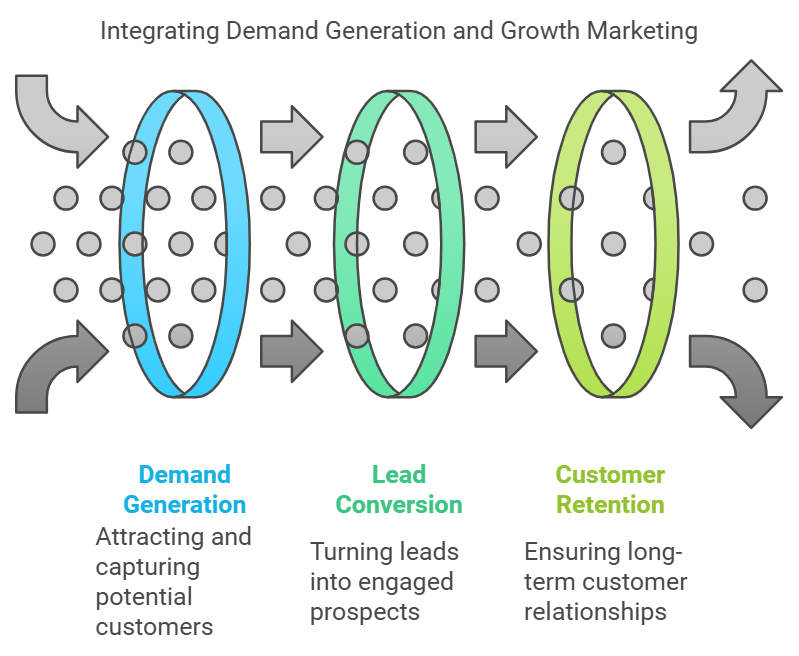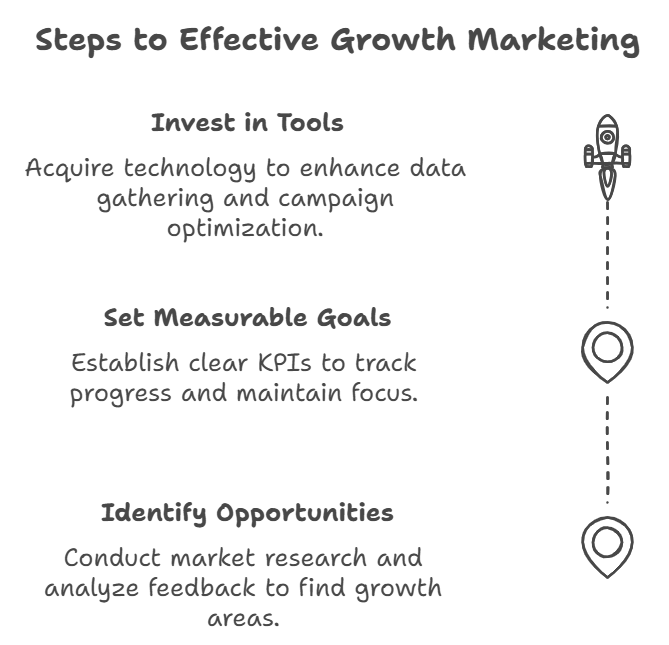Text Marketing for Food Trucks: Simple Tactics for Big Results
Learn simple but powerful SMS marketing tactics for food trucks, from flash deals to loyalty programs.

Discover why growth marketing is crucial for business success. This complete guide covers strategies, benefits, and actionable insights.
Growth marketing is not just a buzzword; it’s a pivotal strategy that modern businesses need to adopt to stay competitive. If your business is looking to achieve sustainable, long-term success, traditional marketing alone may no longer suffice.
In a world where customer behaviors shift rapidly and competition intensifies daily, growth marketing offers a data-driven, customer-centric approach that optimizes every stage of the customer lifecycle. But why exactly do you need growth marketing? Let’s dive into this comprehensive guide to uncover the importance and nuances of growth marketing.
Traditional marketing focuses largely on top-of-the-funnel activities, such as brand awareness and customer acquisition. However, growth marketing expands its reach beyond that, addressing the entire customer journey—from acquisition to retention and everything in between.
Growth marketing adapts to changing customer preferences and the demand for a more personalized experience, making it a more holistic approach.
While traditional marketing is often campaign-based, with fixed goals and timelines, growth marketing is iterative, relying heavily on experimentation and optimization. It’s about continuously testing new strategies, collecting data, and refining the approach to achieve measurable outcomes.
Growth marketing prioritizes long-term growth by analyzing customer behavior, identifying opportunities, and enhancing customer engagement.
Consumers today expect more than just product offerings—they want personalized experiences, rapid responses, and seamless interactions. Growth marketing thrives in this environment because it uses data and experimentation to cater to evolving customer needs. With the ability to pivot quickly, growth marketers ensure that businesses can stay relevant.
In a saturated market, standing out is tough. Growth marketing allows businesses to leverage creativity, innovation, and data analytics to stay ahead of competitors. By optimizing the customer experience and continually improving strategies, companies can differentiate themselves and win over the competition.
Growth marketing is fueled by data. Every decision, whether it’s about user acquisition, conversion rate optimization, or customer retention, is backed by analytics. Data informs marketers about what works, what doesn’t, and where there’s room for improvement.
At its core, growth marketing is about the customer. It’s designed to understand and address the needs, preferences, and pain points of the target audience. By keeping customers at the center of every strategy, growth marketers build lasting relationships that drive loyalty.
One of the distinguishing features of growth marketing is its emphasis on continuous experimentation. Growth marketers run A/B tests, tweak landing pages, modify messaging, and more—all to discover the most effective tactics to drive results. This iterative process allows for constant optimization, ensuring that businesses are always improving their marketing strategies.
Growth marketing and demand generation often get confused, but they serve different purposes. While demand generation focuses on driving awareness and interest at the top of the funnel, growth marketing takes a full-funnel approach. Growth marketers are concerned not just with acquiring customers but also with retaining and expanding relationships with them.
Demand generation brings leads into the funnel, while growth marketing ensures that those leads convert into long-term customers. By focusing on the entire customer lifecycle, growth marketing adds value to demand generation efforts, making them more efficient and impactful.
According to Neil Patel, integrating these two strategies can significantly amplify business growth by ensuring that leads don’t just drop off after initial contact.
 How Growth Marketing Works Across the Customer Lifecycle
How Growth Marketing Works Across the Customer LifecycleGrowth marketing focuses on attracting high-quality leads through targeted campaigns, SEO, paid ads, and partnerships. Unlike traditional marketing, acquisition in growth marketing is measured not only by quantity but also by the quality of leads generated.
Getting users to sign up or purchase is only the beginning. Growth marketers aim to make sure customers have a great first experience, increasing the likelihood of them coming back. Strategies may include onboarding programs, personalized product tutorials, or email nurturing.
Acquiring customers is expensive, so retention is key to long-term profitability. Growth marketers use customer feedback, behavior analytics, and loyalty programs to keep users engaged. Retention strategies ensure customers continue to find value in the product or service over time.
Happy customers are a powerful asset. Growth marketing encourages satisfied customers to spread the word through referral programs and incentives. These tactics can turn customers into brand advocates, driving new acquisitions at a low cost.
The final goal of growth marketing is to increase customer lifetime value (CLV). By focusing on upselling, cross-selling, and reducing churn, growth marketers can drive greater revenue from existing customers, ensuring that each customer contributes more to the bottom line.
Growth marketing isn’t about short-term wins; it’s about creating strategies that will drive long-term success. By focusing on customer retention, ongoing engagement, and revenue optimization, growth marketing ensures sustainable business growth over time.
In a rapidly evolving marketplace, businesses need to adapt quickly. Growth marketing provides the flexibility to experiment with different tactics, measure results, and pivot strategies when necessary. This agility gives companies an edge in staying ahead of trends and competitors.
Retention is one of the cornerstones of growth marketing. According to OneIMS, focusing on the entire customer lifecycle—from first interaction to continued loyalty—ensures that businesses can keep customers happy, reducing churn and improving lifetime value.
Customer experience (CX) is at the heart of growth marketing. Every touchpoint with a customer must be optimized to ensure a seamless and positive interaction. By improving CX, businesses can drive higher conversion rates and build stronger relationships with customers.
Personalization goes beyond just addressing customers by name. Growth marketers leverage data to deliver personalized experiences based on customer behaviors, preferences, and past interactions. This creates more meaningful connections and enhances customer satisfaction.
Growth marketing isn’t restricted to a single platform. It takes a multi-channel approach, utilizing email, social media, paid ads, and content marketing to reach customers wherever they are.
A diversified approach helps maximize reach and ensures that customers are engaged at every stage of their journey. As highlighted by Experience Welcome, a well-executed multi-channel strategy can significantly enhance customer engagement.
With access to endless data points, growth marketers must be selective about which metrics matter most. It’s easy to get overwhelmed by data overload, but focusing on actionable insights helps streamline decision-making.
One of the challenges in growth marketing is striking a balance between short-term gains and long-term strategies. Growth marketers must be strategic in planning for immediate returns while also building sustainable practices for future growth.
 Identify Growth Opportunities
Identify Growth OpportunitiesBefore diving into tactics, businesses must identify areas with the most growth potential. This can be through market research, customer feedback, or performance analytics.
Without clear goals, growth marketing efforts may lose focus. Establishing measurable key performance indicators (KPIs) ensures that businesses can track their progress and adjust strategies as needed.
Growth marketing relies on technology to gather data, automate processes, and optimize campaigns. Investing in the right tools—such as marketing automation platforms and customer data platforms—can greatly enhance the effectiveness of growth marketing efforts.
A SaaS company employed growth marketing strategies focused on customer onboarding and personalized retention campaigns. By optimizing the onboarding process and addressing customer pain points early, the company saw a 30% increase in retention rates within six months.
An e-commerce brand leveraged its existing customer base through a referral program. By incentivizing referrals, the brand saw a 25% increase in new customer acquisitions at a fraction of the cost of paid advertising.
Growth marketing requires a mix of creativity, data analysis, and strategy. Partnering with growth marketing experts can help businesses accelerate their success by providing tailored strategies and advanced tools that would be difficult to implement in-house.
When selecting a growth marketing agency, it’s essential to look for one that understands your industry, has a proven track record, and can customize strategies to meet your business needs.
With customer behaviors changing and competition intensifying, businesses need a strategy that allows them to adapt and grow. Growth marketing offers the agility, customer focus, and data-driven insights needed to thrive in today’s fast-paced market.
Growth marketing is not just a trend; it’s a necessity. By focusing on the entire customer lifecycle, implementing data-driven strategies, and constantly optimizing, businesses can ensure long-term success and stay competitive in a rapidly evolving landscape.